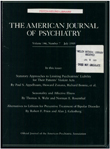The dexamethasone suppression test as a monitor of clinical recovery
Abstract
To evaluate the dexamethasone suppression test (DST) as an aid in monitoring clinical recovery, the authors evaluated 127 outpatients with major depression who received the DST during depression and after clinical recovery. Although DST response varied among the 73 patients who met the Research Diagnostic Criteria for definite endogenous depression, their mean postdexamethasone plasma cortisol level was significantly higher during depression than after recovery. However, the DST's utility in monitoring long-term outcome was not great, as there was a high chance of remaining stable for 6 months after recovery regardless of cortisol value during depression or after recovery.
Access content
To read the fulltext, please use one of the options below to sign in or purchase access.- Personal login
- Institutional Login
- Sign in via OpenAthens
- Register for access
-
Please login/register if you wish to pair your device and check access availability.
Not a subscriber?
PsychiatryOnline subscription options offer access to the DSM-5 library, books, journals, CME, and patient resources. This all-in-one virtual library provides psychiatrists and mental health professionals with key resources for diagnosis, treatment, research, and professional development.
Need more help? PsychiatryOnline Customer Service may be reached by emailing [email protected] or by calling 800-368-5777 (in the U.S.) or 703-907-7322 (outside the U.S.).



